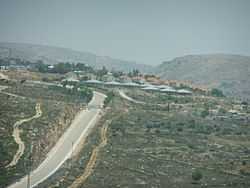Rechelim
| Rechelim רְחלים | |
|---|---|
 | |
 Rechelim | |
| Coordinates: 32°6′10.4″N 35°15′25.83″E / 32.102889°N 35.2571750°ECoordinates: 32°6′10.4″N 35°15′25.83″E / 32.102889°N 35.2571750°E | |
| Council | Shomron |
| Region | West Bank |
| Founded | 1991 |
Rechelim (Hebrew: רְחלים) is an Israeli settlement, legally recognized as such in 2012,[1][2] east of Ariel in the jurisdiction of the Shomron Regional Council in the northern West Bank. Its official boundaries also include nearby Nofei Nehemia.[1] It is situated on Route 60, between Kfar Tapuach and Eli. The village also lies adjacent to the Palestinian towns of Yatma and Qabalan. About 35 families live on the settlement. The international community considers Israeli settlements in the West Bank illegal under international law, but the Israeli government disputes this.[3]
History
On October 27, 1991, busloads of Jewish settlers were on their way to a protest in Tel Aviv against the peace negotiations in Madrid, when one of the buses came under attack by Palestinians.[4] The driver Yitzhak Rofeh from West Jerusalem and Rachel Drouk of Shilo were killed.[4] After Rachel's funeral, women from settlements all over the West Bank set up tents at the site and remained there despite official disapproval.[4] For a long time only women and children lived there.[4] It was named "Rechelim" (plural of the name "Rachel") after Rachel Drouk, Rachel Weiss, who was killed in a Palestinian attack in 1988, and the matriarch Rachel.[4]
In 1999, the Council of the European Union reported that Rechelim gained retroactive approval from the Israeli government on the basis of its location being on survey land that was transferred to state land.[5] In 2007, the Israel Central Bureau of Statistics listed a change in the status of Rechelim as belonging to the area of Kfar Tapuach and not an independent settlement.[6]
Economy
The Tura boutique winery is located in Rechelim.[7] The winery was founded in 2003 as Erez Winery and renamed in 2005. The grapes are grown in vineyards on Har Brakha at an elevation of 840 meters. In 2010, the winery was producing some 12,000 bottles annually, chiefly from Cabernet Sauvignon, Merlot and Chardonnay grapes.[8]
References
- ↑ 1.0 1.1 "PM: Ariel will remain under Israeli sovereignty". The Jerusalem Post. 9 January 2013.
- ↑ "PM sets up panel to legalize state land outposts". The Jerusalem Post. 22 April 2012.
- ↑ "The Geneva Convention". BBC News. 10 December 2009. Retrieved 27 November 2010.
- ↑ 4.0 4.1 4.2 4.3 4.4 Tamar el-Or and Gideon Aran (1995). "Giving birth to a settlement". Gender & Society 9: 60–78.
- ↑ "EU Settlements Watch Executive Summary". Council of the European Union. 19 March 1999. Retrieved 27 November 2011.
- ↑ "Changes 1948-2007". Israel Central Bureau of Statistics. 2007. Retrieved 27 November 2011.
- ↑ Settlers cultivate West Bank tourism to tighten grip on land
- ↑ Wine and Spirits / Tulips for your two lips, Haaretz
| ||||||||||||||||||||||